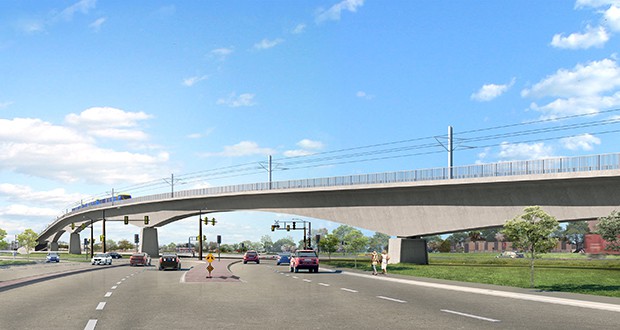
Southwest LRT project seeks civil construction bids
: Finance & Commerce : February 14, 2017 4:52 pm 0
Local and national players are expected to vie for the work package, which covers everything from bridge and utility work to stations and tracks for the 14.5-mile line between downtown Minneapolis and Eden Prairie.
Bids will be opened May 2 at the Met Council’s offices, 390 Robert St. N. in St. Paul, according to the 292-page “Invitation for Bids.” A contract award and the start of construction are targeted for the third quarter of this year.
Given the size and complexity of the job, it’s most likely that all of the proposers will be “joint ventures,” said Tim Worke, CEO of the Associated General Contractors of Minnesota.
When large national builders pursue such projects, they almost always team up with a local partner to gain “the valuable insight into working with local subcontractors, the project owner, and labor needs/resources,” Worke said in an email.
Finance & Commerce reported in December that Walsh Group of Chicago and Brownsville, Wisconsin-based Michels Corp. are partnering on a civil construction bid, as are Burnsville-based Ames Construction and Black River Falls, Wisconsin- based Kraemer North America.
Other potential bidders include the team of Maple Grove-based C.S. McCrossan, Black River Falls, Wisconsin-based Lunda Construction and Pasadena, California-based Parsons Corp.; and Golden Valley-based Mortenson Construction with California-based Granite Construction and Lane Construction Corp. of Connecticut.
Some of the prospective bidders had a hand in building the $957 million Green Line, which extends from downtown St. Paul’s Union Depot to Target Field in downtown Minneapolis.
Walsh oversaw the Green Line’s 7-mile segment in St. Paul, while a joint venture of Ames and C.S. McCrossan worked on the 3-mile stretch in Minneapolis.
The combined value of those contracts was $318.8 million: $205 million for the St. Paul stretch and $113.8 million for Minneapolis. The Met Council isn’t offering a cost estimate on the Southwest contract.
Unlike the Green Line, civil construction will be rolled into one contract for Southwest, also known as the Green Line extension.
“Southwest will have one civil construction contract to avoid having two prime contractors competing for the same pool of subcontractors,” Laura Baenen, the Met Council’s Southwest LRT communications manager, said in an email.
Baenen added that civil construction designs are “100 percent complete, while the operations and maintenance facility and systems contract are nearly 100 percent complete.”
According to the invitation to bid, the project includes 29 new bridges, modifications to seven existing bridges, six new pedestrian tunnels, and two “cut and cover” tunnels — one each under Highway 62 and the Kenilworth Corridor.
In addition, workers will build 15 stations, demolish 14 buildings, put up 117 retaining walls, install 153,440 feet of track, build a 450-space parking ramp and add seven park-and-ride lots with a combined 1,833 parking spaces.
Other work within the contract includes trail improvements, freight rail relocation, underground utilities, drainage, sidewalk and road pavements, street lighting, traffic signals and foundations for the overhead “catenary” poles.
The call for bids comes at a time when costs are on the rise and workers are hard to come by.
The Associated General Contractors of America noted Tuesday that construction companies are “getting squeezed by increasing materials and labor costs and slower increases in what they charge to build projects.”
Worke said the workforce challenge is a “mixed bag” for Southwest. The timing is good in a sense because other big local projects are now complete (U.S. Bank Stadium in Minneapolis) or nearing completion (St. Croix Crossing), he noted.
“With that being said … we are in the midst of a workforce shortage overall and that will create some challenges that will ebb and flow over the long duration of the project,” Worke said.
The Met Council estimates the project will create 7,500 construction jobs.
The regional planning agency has a 16 percent goal for participation of Disadvantaged Business Enterprises, including women- and minority-owned businesses. The project’s workforce goals are 32 percent minorities and 6 percent women.
The council will seek bids later this year for systems work. Construction of an operations and maintenance facility will be up for bid in a separate contract. Both are scheduled to be awarded in late summer, Baenen said.
The 172,000-square-foot operations maintenance facility will be built at Fifth Street South and 16th Avenue South in Hopkins, “stretching for a block between Fifth Street South and Sixth Street South,” Baenen said.
Southwest LRT backers hope to secure half of the project’s funds from the federal government. A funding commitment from the Federal Transit Administration is expected to be announced in July.
The Counties Transit Improvement Board, the biggest local funder, is on the hook for $516.5 million, plus $11.75 million in certificates of participation.
Other funding sources include the Metropolitan Council ($91.75 million in certificates of participation), Hennepin County Regional Railroad Authority ($185.8 million), the state of Minnesota ($30.3 million), local cities ($23.7 million) and in-kind land transfers along the line ($69 million).

